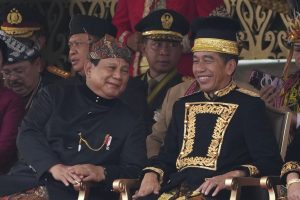A month ahead of his inauguration, it is widely expected that Indonesian President-elect Prabowo Subianto’s cabinet will have more ministers than those of his predecessor Joko “Jokowi” Widodo. While the exact number of ministers has not been announced, current reports suggest Prabowo will appoint at least 44 people to his cabinet, compared to Jokowi’s 34. If this happens, Prabowo’s cabinet will be the largest in Indonesia since the start of the reform era in 1998.
Prabowo’s strategy of forming a broad coalition is not new. During the presidential election in February, his support came from four major parliamentary parties: his Great Indonesia Movement (Gerindra), the Functional Group Party (Golkar), the Democratic Party, and the National Mandate Party (PAN). Together, they helped Prabowo win 58.58 percent of the vote.
Despite securing more than half of the parliamentary seats, each of the parties backing Prabowo polled fewer votes than the Indonesian Democratic Party of Struggle (PDI-P) in the legislative elections, that were held concurrently with the presidential poll. The PDI-P secured 16.72 percent of the vote, while Golkar and Gerindra followed with 15.28 percent and 13.22 percent, respectively. This showed that, while Prabowo won the presidency, the PDI-P still retained strong grassroots support.
In response to this legislative setback, Prabowo’s strategy has been to further expand his coalition. Previously named the Advancing Indonesia Coalition (KIM), his coalition has now been rebranded as KIM Plus. It has brought in parties that previously supported his two rivals in the presidential election, including such as the National Democratic Party (NasDem), the National Awakening Party (PKB), the Prosperous Justice Party (PKS), and the United Development Party (PPP).
This means KIM Plus is now backed by eight parliamentary parties. The coalition aims to secure upcoming regional elections in key constituencies such as in Jakarta, Central Java, North Sumatra, and Banten, though the coalition is not aligned in some regions.
This political maneuver leaves the PDI-P as the sole major parliamentary party outside the ruling government, suggesting that Prabowo’s regime may face minimal opposition over the next five years. This strategy is not entirely new. Previously, Jokowi, who was supported by five parliamentary parties during the 2019 election, also successfully brought four additional parties into his government, meaning that his government faced no significant opposition.
Prabowo has recently expressed his view that opposition is not in line with Indonesian culture. Speaking at the Third NasDem Congress on August 27, he argued, “We must work together. We must collaborate, and we shouldn’t just follow other cultures. Western culture or whichever culture might like opposition, conflicts, and constant disagreements. Opposition, refusing to cooperate, that might be their culture.”
The Perils of a Government Without Opposition
While Prabowo’s vision of a government free from opposition may seem like a pragmatic political strategy, it carries significant risks. From an economic perspective, such a government could lead Indonesia in one of two directions: to economic prosperity akin to Singapore or social unrest and economic failure like Bangladesh.
Singapore, despite being a multi-party system, has been dominated by the People’s Action Party (PAP) since its independence in 1965. Under the leadership of its first prime minister, Lee Kuan Yew (LKY), Singapore’s economy flourished with minimal opposition. Under his PAP successors, Lee’s legacy continues to influence Singapore’s political and economic trajectory. With limited opposition and a singular focus on economic development, Singapore’s GDP per capita soared from $516 in 1965 to $84,734 in 2023, surpassing several Western countries, including Canada, the Netherlands, Sweden, and the United States.
However, Lee’s success came at the cost of individual freedoms. His governance style has often been described as “soft authoritarianism,” and Singapore’s score on the Freedom House’s 2024 index remains 48 out of 100, indicating restricted civil liberties. Yet, Singapore’s economic achievements are undeniable, and the nation has become a global economic powerhouse.
On the other hand, Bangladesh presents a cautionary tale of what can happen when a government lacks opposition and also fails to deliver economic prosperity. Led by Sheikh Hasina for four consecutive terms, Bangladesh’s political system has been characterized by suppression of opposition parties. In the lead-up to this year’s elections, the main opposition party, the Bangladesh Nationalist Party, announced that it was boycotting the poll, citing the lack of freedom and fairness under Hasina’s regime.
Despite winning the election, Hasina’s leadership has not produced the same economic success as Singapore. Bangladesh’s GDP per capita, while increasing from $101 in 1965 to $2,529 in 2024, remains one of the lowest in the world, lower than Nicaragua, Papua New Guinea, and Honduras. Bangladesh is also rated as only “partly free” by Freedom House in 2024, with a score of 40 out of 100. The political implications of this were dramatically demonstrated earlier this summer, when widespread protests forced Hasina to resign, with uncertain implications for the country’s future.
Lessons for Indonesia
The global experiences of Singapore and Bangladesh provide a useful reflection for Indonesia’s future under Prabowo’s broad coalition government. On one hand, a government with minimal opposition could lead to rapid economic growth. On the other hand, it could lead to public upheaval and economic stagnation if checks and balances are not maintained.
It is important to note that Singapore’s success as a one-party-dominated government is an outlier. Studies, such as the one conducted by MIT economist Daron Acemoglu in 2019, indicate that democracy and the presence of political opposition tend to increase GDP per capita by about 20 percent in the long term. Democratic systems with strong opposition are generally more conducive to sustainable economic prosperity.
As Indonesia moves toward a government with diminished opposition, its citizens must reflect on whether this is the future they envision: economic prosperity at the potential cost of political freedom and individual rights. Ultimately, the people will have to decide whether this trade-off is worth the risk.

































